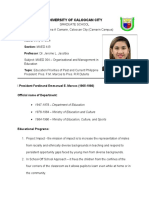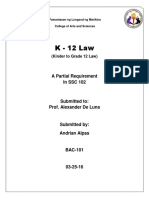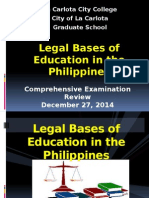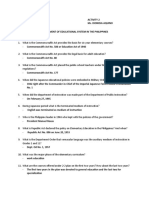Educ 5 Semifinal Coverage
Educ 5 Semifinal Coverage
Uploaded by
vanessa mae padlaCopyright:
Available Formats
Educ 5 Semifinal Coverage
Educ 5 Semifinal Coverage
Uploaded by
vanessa mae padlaOriginal Description:
Original Title
Copyright
Available Formats
Share this document
Did you find this document useful?
Is this content inappropriate?
Copyright:
Available Formats
Educ 5 Semifinal Coverage
Educ 5 Semifinal Coverage
Uploaded by
vanessa mae padlaCopyright:
Available Formats
REPORT #5
EDUCATING THE WORLD
A. EDUCATION AND GLOBALIZATION
• Globalization- is characterized by the extensive movement or flow of information, ideas,
images, capital and people across increasingly permeable political borders due to economic
and technological change (Castles, 2004; Luke & Carrington, 2001).
• Globalization- has connected every people and every society dramatically. It has brought
technological advancements that made ideas, products, information, and services accessible to
all people.
• Globalization- made it possible for every individual to be a local resident as well as global
worker, a national citizen and global citizen.
The United Nations Educational, Scientific and Cultural Organization (UNESCO)- is a specialized
agency of the UN. UNESCO represents one of the outstanding non-governmental organizations working to
address issues of global improvements in a wide array of areas related to education.
B. EDUCATION SYSTEM’S RESPOND TO GLOBALIZATION
In the respond to these expectation, each country is investing huge amounts of money to improve its
education system.
Examples of innovations are being implemented:
1. Gifted education
2. Transition program
3. Special education programs
4. Special interest program
5. Science, Technology, Engineering, Agriculture, and Mathematics (STEAM) programs
6. Literacy programs
7. ICT integrations in teaching and learning
8. Foreign language program
9. Alternative learning programs
10. Contextualization of curriculum and instruction.
C. COMPETENCIES FOR GLOBAL TEACHERS
Being a globally competent teacher requires embracing a mindset that translates personal global
competence into professional classroom practice. It is a vision of equitable teaching and learning
that enables students to thrive in an ever-changing world.
Part of the Teaching Competency Framework:
1. Facilitating the development of learner’s life and career skills
2. Creating a conducive learning environment
3. Facilitating learning
4. Preparing appropriate lesson plans in line with the school vision and mission
5. Developing higher-order thinking skills (HOTS)
6. Developing and utilizing teaching and learning resources
7. Enhancing ethical and moral values
8. Assessing and evaluating learner performance
9. Engaging in professional development
10. Networking with stakeholders, especially with parents
11. Managing student welfare and other tasks
REPORT #6
LEGAL BASES OF THE TEACHING PROFESSION
ARTICLE XIV OF THE PHILIPPINE CONSTITUTION
(Education, Science and Technology, Arts, Culture, and Sports Education)
Provides the general framework of education in the country. It shows how the state recognizes the importance of
education, science and technology, cultural development, and sports and wellness in the life state of the people.
Embodies the utopian and economic goal for education in the Philippines.
Section 1-5 : Education
Section 6-9 : Language
Section 10-13 : Science and Technology
Section 14-18 : Arts and Culture
Section 19: Sports
EDUCATION ACT OF 1962
RA 232, more popularly known as the Education Act of 1982, signed into law by then President Ferdinand
Marcos on September 11, 1982. This seminal law governs both formal and nonformal education systems in
public and private schools in all levels of instruction in the country
• Rights of students in School (Section 9)
• Rights of All School Personnel (Section 10)
• Special Rights and/or Privileges of Teaching or Academic Staff (Section 11)
➢ Right to be free compulsory assignment not related to their duties defined in their appointment
or employment contracts unless compensated thereof. (additional compensation Sec. 14 R.A.
4670- at least 25% his regular remuneration)
➢ Right to intellectual property.
➢ Teachers are persons in authority when in lawful discharge of duties and responsibilities…
shall therefore be accorded due respect and protection (Commonwealth Act No. 578)
➢ Teachers shall be given opportunity to choose career alternatives for advancements.
• Rights of Administrators
• Rights of Schools (Section 13)
• Maintenance of Quality Education
➢ Voluntary Accreditation (Section 29)
➢ Teachers and Administrators obligations and qualification (Sections 16 and 17)
➢ Government Financial Assistance to Private Schools (Section 41)
REPUBLIC ACT 7836
RA 7836 or the Philippine Teachers Professionalization Act of 1994 (December 16, 1994) strengthens the
supervision and regulation of the practice of teaching in the Philippines. All teachers are required to take and
pass Licensure Examination for Teachers (LET).It covers all teachers in all levels of education from preschool
to secondary whether part-time or full-time.
•This law recognizes the vital contributions of teachers in nation building and development.
•Teachers are responsible for the development of good and literate citizens.
•It is the role of the state to ensure quality education among all its citizens by professionalizing the practice of
the teaching profession in the whole country.
REPUBLIC ACT 9293
RA 9293 entitled “An Act Amending Certain Sections of Republic Act Numbered Seventy-Eight Hundred
and Thirty-Six (R.A. 7836) Otherwise Known as the Philippine Teachers Professionalization Act of 1994”
amended on April 21, 2004.Some of the following amendments are done:
➢ Section 15, (e) (3) of Republic Act No. 7836 - . Qualification Requirements of Applicants
➢ SEC. 2 Section 26. Registration and Exception - No person shall engage in teaching and/or act as a
professional teacher as defined in this Act, whether in the preschool, elementary or secondary level,
unless the person is a duly registered professional teacher, and a holder of a valid certificate of
registration and a valid professional license or a holder of a valid special/temporary permit.
➢ SEC.3 Section 31. Transitory Provision. – Special permits, with a validity of three (3) and five (5) years,
issued to para-teachers by the Board for Professional Teachers before the effectivity of this Act shall
be allowed to expire based on the period granted therein: Provided, that only special permits with a
validity of three (3) years may be renewed upon expiration for a non-extendible period of two (2) years.”
➢ SEC 4. References to the term “Department of Education, Culture and Sports”, in section 4 (a) and
section 25, and the term “DECS” in section 20, of the same Act, are hereby amended to read as
“Department of Education” and “DepEd”, respectively.
REPUBLIC ACT NO.10533 THE ENHANCE BASIC EDUCATION ACT IN 2013
President Benigno Aquino III approved Republic Act (RA) 10533, signing into law the K+12 program on
May 15, 2013. This act will give every student an opportunity to receive quality education that is globally
competitive based on pedagogically sound curriculum that is at par with international standards.
➢ SECTION 4 ENHANCED BASIC EDUCATION PROGRAM- The enhanced basic education
program encompasses at least one (1) year of kindergarten education, six (6) years of elementary
education, six (6) years of secondary education, in that sequence. Secondary education includes four
(4) years of junior high school and two (2) years of senior high school education. Kindergarten
education- shall mean one (1) year of preparatory education for children at least five (5) years old as a
prerequisite for grade 1.
ADDITIONAL REPUBLIC ACTS TO REMEMBER FOR LET TAKERS
RA 7722 - “The Higher Education Act of 1994”, was signed into law by former President Fidel Valdez Ramos
on May 18, 1994, creating the Commission on Higher Education (CHED).
RA 7796 "Technical Education and Skills Development Act of 1994", which was signed into law by President
Fidel V. Ramos on August 25, 1994.
RA 9155 Governance of Basic Education Act of 2001
RA 9647 This Act shall be known as the “Philippine Normal University Modernization Act of 2009. This is
an An Act Designating the Philippine Normal University as the country's national center for teacher education.
RA 4670 known as the "Magna Carta for Public School Teachers" and shall apply to all public school teachers
except those in the professorial staff of state colleges and universities.
RA 10157 otherwise known as the Kindergarten Education Act of 2012, provides for the institutionalization
of kindergarten education as part of the basic education in the Philippine Educational System.
RA 6655 “Free Public Secondary Education Act of 1988.”
RA 7877 The Anti-Sexual Harassment Act of 1995.
RA 9262 also known as the Anti-Violence Against Women and their Children Act of 2004.
RA 10627 This Act shall be known as the “Anti-Bullying Act of 2013”
You might also like
- DepEd Manual ReviewerDocument51 pagesDepEd Manual RevieweralmorsNo ratings yet
- Sofia Valdez, Future Prez Teaching GuideDocument4 pagesSofia Valdez, Future Prez Teaching GuideAbrams Books100% (1)
- Relevant Laws For TeachersDocument3 pagesRelevant Laws For TeachersJia Moreno89% (9)
- 5 LEGAL BASES IN FINANCING eDUCATIONDocument7 pages5 LEGAL BASES IN FINANCING eDUCATIONnoel75% (4)
- Legal Basis of EducationDocument19 pagesLegal Basis of EducationNestor Balboa100% (2)
- PaperDocument15 pagesPaperNorhanie M AliNo ratings yet
- Executive Order No 117Document39 pagesExecutive Order No 117Jeffrey Salazar Albania100% (4)
- Philippine EducationDocument21 pagesPhilippine EducationglemarmonsalesNo ratings yet
- 16 Legal BasesDocument4 pages16 Legal BasesShenna Pitalgo TesoroNo ratings yet
- Module 1Document6 pagesModule 1Dahlia Galvan- MaglasangNo ratings yet
- Lesson Plan Group 6Document7 pagesLesson Plan Group 6david.oballasNo ratings yet
- Basic Laws On The Professionalization of TeachingDocument17 pagesBasic Laws On The Professionalization of TeachingKathryn Ramos DelicaNo ratings yet
- MaImeldaIRedaniel LegalBasesofEducation RevisedDocument8 pagesMaImeldaIRedaniel LegalBasesofEducation Revisedrosabelromero09No ratings yet
- Lesson 10 Legal Foundations of CurriculumDocument4 pagesLesson 10 Legal Foundations of CurriculumFritz VenezuelaNo ratings yet
- Legal Bases of EducationDocument20 pagesLegal Bases of EducationFatima Dublois100% (6)
- Trifocalization of The Philippine Educational System HistoryDocument8 pagesTrifocalization of The Philippine Educational System HistorySerjoe Gutierrez100% (1)
- Week 7 Legal FoundationsDocument35 pagesWeek 7 Legal FoundationsJoseph StalinNo ratings yet
- Republic Act NoDocument7 pagesRepublic Act NoJeth Vigilla NangcaNo ratings yet
- Education Priorities of Past and Current Philippine President Pres. F.M. Marcos To Pres. R.R Duterte MAED 304Document10 pagesEducation Priorities of Past and Current Philippine President Pres. F.M. Marcos To Pres. R.R Duterte MAED 304Daniel c. Magno jr.No ratings yet
- TrifocalizationDocument11 pagesTrifocalizationJhun Lerry TayanNo ratings yet
- List of Philippine Education LawsDocument217 pagesList of Philippine Education LawsGrace Salomon BaldoviaNo ratings yet
- EMDGT 613 Education Laws Practices Trends and Issues e Education ApproachDocument28 pagesEMDGT 613 Education Laws Practices Trends and Issues e Education ApproachAiyee VonNo ratings yet
- Legal Bases of PesDocument42 pagesLegal Bases of Pesjacqueline arzagaNo ratings yet
- K-12 LawDocument10 pagesK-12 LawMark LesterNo ratings yet
- Mary Jane Malapitan Reflection PaperDocument9 pagesMary Jane Malapitan Reflection PaperMary Jane Sedoriosa MalapitanNo ratings yet
- HandoutDocument27 pagesHandoutReeree GampalNo ratings yet
- Ra 10533Document20 pagesRa 10533MYRNA GUINAPONNo ratings yet
- Legal Bases of Education in The Philippines and Functions of ChedDocument6 pagesLegal Bases of Education in The Philippines and Functions of ChedJrPazNo ratings yet
- Legal Foundation of Curriculum: Group 4Document31 pagesLegal Foundation of Curriculum: Group 4Rycel Juco100% (1)
- Prof Ed 6 Report OutlineDocument6 pagesProf Ed 6 Report OutlinePaula Marie AgripaNo ratings yet
- EDCOMDocument24 pagesEDCOMEZ SaydovenNo ratings yet
- Group 2 III. Aims of Philippine EducationDocument38 pagesGroup 2 III. Aims of Philippine EducationLeo RodNo ratings yet
- Educ 101 (Summary)Document13 pagesEduc 101 (Summary)Brooklyn BabyNo ratings yet
- EDCOMDocument19 pagesEDCOMEZ SaydovenNo ratings yet
- Legal Bases of Philippine Educational SystemDocument42 pagesLegal Bases of Philippine Educational Systemjacqueline arzaga100% (2)
- PH PresidentsDocument4 pagesPH Presidentsandreidalere22No ratings yet
- Assignment 5Document5 pagesAssignment 5Allan GonedaNo ratings yet
- 2 BP232Document39 pages2 BP232Christine Comia CorderoNo ratings yet
- Republic Act No. 7796Document2 pagesRepublic Act No. 7796JERSOM TABOTNo ratings yet
- Unit V School Curriculum Changes, Reforms, and Innovations: Learning ObjectivesDocument14 pagesUnit V School Curriculum Changes, Reforms, and Innovations: Learning ObjectivesJimuel AntonioNo ratings yet
- Midterm SchoolDocument50 pagesMidterm SchooldonquecrizelmayNo ratings yet
- Trifocalization of The Phillipine Educational SystemDocument48 pagesTrifocalization of The Phillipine Educational SystemSerjoe GutierrezNo ratings yet
- Curriculum Development: Submitted By: Ayesha Khalid Assignment Number 2 B.ED 1.5 YearDocument16 pagesCurriculum Development: Submitted By: Ayesha Khalid Assignment Number 2 B.ED 1.5 YearAyesha KhalidNo ratings yet
- Educ 303 Chapter 6 Laws of TeachersDocument15 pagesEduc 303 Chapter 6 Laws of TeachersCatherine M. VidalNo ratings yet
- Ra 10533Document8 pagesRa 10533MakilingE.CarlosNo ratings yet
- Legal Bases of Teaching ProfessionDocument78 pagesLegal Bases of Teaching ProfessionAl Patrick ChavitNo ratings yet
- Iplementation of Curriculum of The President of The PhilippinesDocument4 pagesIplementation of Curriculum of The President of The Philippineslazer stormNo ratings yet
- The Legal Bases of EducationDocument2 pagesThe Legal Bases of EducationPau CaminsNo ratings yet
- Legal Foundation of Education in The PhilDocument67 pagesLegal Foundation of Education in The PhilNetzky Cajeda100% (2)
- Inclusive EducationDocument4 pagesInclusive Educationhft66v8tjcNo ratings yet
- Prof 9 - Activity 2Document4 pagesProf 9 - Activity 2Babylyn MorallosNo ratings yet
- Legal Underpinnings of Philippine Education: Group 3Document17 pagesLegal Underpinnings of Philippine Education: Group 3Claude Philip Allauigan100% (1)
- Ramos Administration (1992 - 1998) : EDCOM - Congressional Commission On EducationDocument55 pagesRamos Administration (1992 - 1998) : EDCOM - Congressional Commission On EducationDwity LangNo ratings yet
- WR Vergeldedios Educ9Document5 pagesWR Vergeldedios Educ9Melvin Vergel De DiosNo ratings yet
- LET Reviewer FOUNDATION OF SPECIAL AND INCLUSIVE EDUCATIONDocument56 pagesLET Reviewer FOUNDATION OF SPECIAL AND INCLUSIVE EDUCATIONZen X ZenNo ratings yet
- 1 Legal Bases of EducationDocument12 pages1 Legal Bases of EducationJochris IriolaNo ratings yet
- Legal Bases of EducationDocument2 pagesLegal Bases of EducationCordilyn GarciaNo ratings yet
- RAPANAN, MIKAELA S. - Educational Legislation and Comparative StudiesDocument22 pagesRAPANAN, MIKAELA S. - Educational Legislation and Comparative StudiesMika RapananNo ratings yet
- Reimagining Schools and School Systems: Success for All Students in All SettingsFrom EverandReimagining Schools and School Systems: Success for All Students in All SettingsNo ratings yet
- Global Education Reform: The Universe Is Governed by a Sequence of Realms; Hence, Global Education Reform Is a Dignified Path to Peace and Unity, a Promised Corridor for the Eradication of Lingering Human Prejudice, Discrimination, Injustice, and Language Barriers.From EverandGlobal Education Reform: The Universe Is Governed by a Sequence of Realms; Hence, Global Education Reform Is a Dignified Path to Peace and Unity, a Promised Corridor for the Eradication of Lingering Human Prejudice, Discrimination, Injustice, and Language Barriers.No ratings yet
- Chapter 19Document4 pagesChapter 19vanessa mae padlaNo ratings yet
- Prof. Ed Pre Board ExamDocument17 pagesProf. Ed Pre Board Examvanessa mae padlaNo ratings yet
- Educ 3 GuideDocument2 pagesEduc 3 Guidevanessa mae padlaNo ratings yet
- EDUC 4 GROUP 1 Creating A Learner Centered Classroom and Teaching Students How To LearnDocument3 pagesEDUC 4 GROUP 1 Creating A Learner Centered Classroom and Teaching Students How To Learnvanessa mae padlaNo ratings yet
- Class 6 Lesson Plan LivingDocument10 pagesClass 6 Lesson Plan LivingHIRAL SOLANKINo ratings yet
- Technical Assistance PlanDocument8 pagesTechnical Assistance PlanVINES BUGNALEN50% (2)
- Suria Ani Binti Ali: Barista Instea CafeDocument1 pageSuria Ani Binti Ali: Barista Instea Cafe8g2zftszfjNo ratings yet
- Reading Checklist PDFDocument2 pagesReading Checklist PDFpuancacaNo ratings yet
- w9 12 Pathf 2 Module 4 Final TermDocument8 pagesw9 12 Pathf 2 Module 4 Final TermshineNo ratings yet
- DM 244 S 2023 Online Quality Assurance of Division Fourth Quarterly Assessment DFQA For SY 2022 2023Document22 pagesDM 244 S 2023 Online Quality Assurance of Division Fourth Quarterly Assessment DFQA For SY 2022 2023EA CrisostomoNo ratings yet
- Kcpe Online ResultslipDocument10 pagesKcpe Online Resultslipabelkemboi841No ratings yet
- Kiên GiangDocument18 pagesKiên Giangenfa.work.confNo ratings yet
- STCW Circular No. 2015 06 RFPNWDocument11 pagesSTCW Circular No. 2015 06 RFPNWmochausonNo ratings yet
- Grade 2 PE CGDocument6 pagesGrade 2 PE CGAriah TugadoNo ratings yet
- AXE Xamene Ambridge: CAE: C1 Advanced Intensiv / Bilingv 560 565Document1 pageAXE Xamene Ambridge: CAE: C1 Advanced Intensiv / Bilingv 560 565Popete Mihail ValentinNo ratings yet
- SMK Taman Widuri Cefr Daily Lesson Plan 2020Document5 pagesSMK Taman Widuri Cefr Daily Lesson Plan 2020Ramzan Khairunnisaa AliNo ratings yet
- Enhancing Writing Skills Through Chatgpt: An Experimental Study in The Context of ErgonomicsDocument12 pagesEnhancing Writing Skills Through Chatgpt: An Experimental Study in The Context of ErgonomicsTuyết Phương Lê ThịNo ratings yet
- Resume May 2022Document2 pagesResume May 2022sstutoringNo ratings yet
- Slac RPMSDocument9 pagesSlac RPMSCrizel SalvadorNo ratings yet
- Additional-9781398379862 Marketing Sample SODocument16 pagesAdditional-9781398379862 Marketing Sample SOmulakomaureen50No ratings yet
- Resignation LetterDocument2 pagesResignation Letterdennisgdagooc100% (1)
- Session 1 - DepEd Order No. 11, S. 2021 Part 1Document24 pagesSession 1 - DepEd Order No. 11, S. 2021 Part 1Joseph De CastroNo ratings yet
- Ghost Boys Plot TestDocument2 pagesGhost Boys Plot Testmartinique.annaNo ratings yet
- Learning Delivery Modalities Course 2 AutosavedDocument40 pagesLearning Delivery Modalities Course 2 AutosavedMerream Jenobisa ManickNo ratings yet
- Pang ResearchDocument4 pagesPang Researchsiremma011No ratings yet
- Aaroh Early Learning Centre Job Description: About UsDocument2 pagesAaroh Early Learning Centre Job Description: About Ussirn8281No ratings yet
- LDM2 Module 2 With Answers PDFDocument4 pagesLDM2 Module 2 With Answers PDFShen-shen Tongson Madreo-Mas Millado100% (1)
- Pepeng Puno v1.0Document48 pagesPepeng Puno v1.0Rhon T. BergadoNo ratings yet
- ChatGPT Interview Coach Jan Tegze 1681742790Document10 pagesChatGPT Interview Coach Jan Tegze 1681742790petronelsilviuNo ratings yet
- Schools As Cultural InstitutionDocument31 pagesSchools As Cultural InstitutionFroilan TinduganNo ratings yet
- Kuwait University ThesisDocument7 pagesKuwait University Thesisafcnahwvk100% (1)
- ENGLISH MIDDLE TEST Grade 9Document2 pagesENGLISH MIDDLE TEST Grade 9evam70287No ratings yet
- Grade 2 Mathematics QuestionDocument1 pageGrade 2 Mathematics Questionshrivastavanuj823No ratings yet





























































































